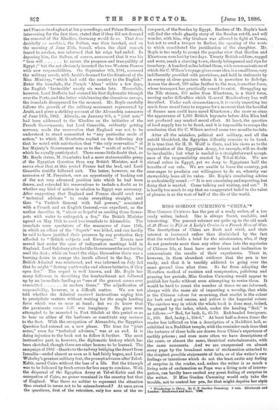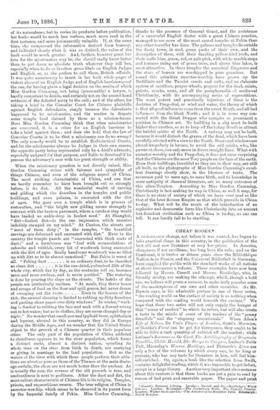MISS GORDON CUMMING'S " CHINA." 0 Miss GORDON CUMMING has the
pen of a ready writer, of a too ready writer, indeed. She is always fluent, readable, and interesting. The present volumes are quite up to the old mark of At Home in Fiji or A Lady's Cruise in a French Man-of- War. The descriptions of China are fresh and vivid, and their interest is increased rather than diminished by the fact that the writer holds a brief for the missionaries, who, if they do not penetrate more than any other class into the mysteries of Chinese life, at least have more leisure and inclination to communicate the results of their experiences. There is, however, in them abundant evidence that the pen is too ready, and that it is terribly addicted to going over the same ground time after time. So far from adopting the Horatian method of excision and compression, polishing and pruning her periods, Miss Gordon Cumming would appear to publish her books without even attempting to revise them. It would be hard to count the number of times we are informed, always with the same air of imparting a novelty, that white is the Chinese colour for mourning, that scarlet is the colour for luck and good omens, and yellow is the Imperial colour. The careless way in which the whole book is done may, indeed, be ganged by the index, which, under the heading "Red," is as follows :—" Red, for luck, ii., 65.70. Red-headed foreigners, ii., 260. Red, lucky, i., 104-6." At least half-a-dozen times the reader has inflicted on him a description of a Buddhist hell, as exhibited in a Buddhist temple, with the reminder each time that the tortures of these hells are drawn from China's experience of earthly prisons ; and even more often we have descriptions of the same, or almost the same, theatrical entertainments, with the same comments. And we are exasperated on almost every page by the broadcast notes of exclamation attached to the simplest possible statements of facts, or of the writer's own feelings or intentions which do not the least excite any feeling of surprise in the reader, and, unless the writer is as much a living note of exclamation as Pope was a living note of interro- gation, can hardly have excited any great feeling of surprise in the writer. If Miss Gordon Gumming would only take the trouble, not to control her pen, for that might deprive her style • Wanderings in China. By O. P. Gordon Cumming. 2 vols. Edinburgh and London: Blsokwoodsuld Bons. VOL
of its naturalness, but to revise its products before publication, her books would be much less verbose, much more read in the first instance, and more permanently valuable. If, at the same time, she compressed the information derived from hearsay, and indicated clearly when it was so derived, the value of the book would be much greater. And, further, however great her love for the missionaries may be, she should really know better than to put down as absolute truth whatever they tell her, especially when to do so involves gross libels on English Judges and English, or, as she prefers to call them, British officials. It was quite unnecessary to insert in her book whole pages of violent abuse of an English Judge and of English barristers,—of the one, for having given a legal decision on the merits of which Miss Gordon Cumming, not being (presumably) a lawyer, is hardly competent to decide, and certainly not on the second-hand evidence of the defeated party to the suit ; and of the other, for taking a brief in the Consular Court for Chinese plaintiffs against English defendants, simply because the defendants happened to be missionaries, and the matter in dispute some temple land claimed by them as a mission-house. Does Miss Gordon Cumming think that when missionaries are concerned, it is a crime for an English barrister to take a brief against them ; and does she hold that the law of Consular Courts is to be that a missionary can do no wrong P The only remedy would be to establish Ecclesiastical Courts, and let the missionaries always be Judges in their own causes, the opposite party being represented only by a devil's advocate, especially assigned for that purpose, and liable to dismissal if he presses the adversary's case with too great strength or ability.
When the missionary question is not directly raised, Miss Gordon Cumming writes with fairness and sympathy of things Chinese, and even of the religious aspect of China. The most striking characteristic of China, and one that we hardly remember to have been brought out so strongly before, is its dirt. All the wonderful wealth of carving and gilding which she describes in the temples and public buildings, and even palaces, is encrusted with the dirt of ages. She goes over a temple which is in process of restoration, and " the bright new gilding seems strangely in contrast with the broken pavement, where a careless step would have landed us ankle-deep in foulest mud." At Shanghai, "dirt—foulest dirt—is the one impression which remains indelibly stamped on my mind." At Canton, the streets are "most of them dirty ;" in the temples, " the 'beautiful carvings are deformed and encrusted with dirt." Even in the country the temple panels are " encrusted with thick coats of dust;" and a farmhouse was "foul with accumulations of cobwebs and rubbish, every bit of woodwork being encrusted with the dirt of ages. Really handsome woodwork was so filled up with dirt as to be almost unnoticed." But Pekin is worst of all. " Peking dust is no ordinary dust, to be classified as clean dirt it is the sun-dried, pulverised filth of the whole city, which day by day, as the centuries roll on, becomes more and more unclean, and is never purified." The watering is done by pouring the slops on the streets. The habits of the people are intrinsically unclean. "At meals, they throw bones and scraps of food on the floor and spill grease, but never dream of sweeping out the room Even in the houses of the rich, the annual cleaning is limited to rubbing up dirty furniture and pasting clean paper over dirty windows." In winter, " wash- ing is limited to rubbing the face and neck with a flannel wrung out in hot water; but as to clothes, they are never changed day or night." No wonder that small-pox and typhoid fever, ophthalmia and leprosy, abound in this country, as they did in Europe during the Middle Ages, and no wonder that the United States object to the growth of a Chinese quarter in their populous cities. The only part of the population of China addicted to cleanliness appears to be the river population, which forms a distinct caste, almost a distinct nation, spending its whole time on the river from birth to death, not marrying or giving in marriage to the land population. But as the waters of the river with which these people perform their abla- tions are about as pure as those of the Thames at the main drain- age outfalls, the clean are not much better than the unclean. As is usually the case, the reverse of the old proverb is true, and uncleanliness is next to godliness. After the dust and dirt, the most salient characteristic of Chinese life is its religion. Temples, priests, and superstitions swarm. The true religion of China is ancestor-worship, which seems to be observed in its purest form by the Imperial family of Pekin. Miss Gordon Cumming, thanks to the presence of General Grant, and the assistance of a successful English doctor with a great Chinese practice, managed to see more of the most sacred temples at Pekin than any other traveller has done. The palaces and temples lie outside the dusty town, in cool, green parks of their own, and the description of them, with their dazzling yellow-tiled roofs, and their walls blue, green, red, or pale pink, with white marble steps and terraces rising out of green trees, and above blue lakes, is most attractive. In these temples the ancestral Emperors and the stars of heaven are worshipped in pure grandeur. But round this primitive ancestor-worship have grown up the Buddhists and the Taouist creeds and cults, and an elaborate system of sacrifices, prayer-wheels, prayers for the dead, saints, priests, monks, nuns, and all the paraphernalia of mediaeval Christianity, with its accompanying series of superstitions. The most potent and practically injurious of these is the doctrine of Feng-sbui, or wind and water, the theory of which is that all good influences come from the sweet South, and all bad influences from the bleak North ;, and it is in some way con- nected with the Great Dragon who occupies so prominent a position in Chinese art. No building in a city must be built higher than another, so as to keep off the balmy South or attract the baleful spirits of the North. A railway may not be built, because it would disturb the graves of the dead, which have been carefully selected with a view to the South. Doors and windows are placed irregularly in houses, to avoid the evil spirits, who, like pawns at chess, can only move in direct straight lines. What with ancestor-worship and the Feng-shui, it does not seem surprising that the Chinese are the most Tory people on the face of the earth. Even their buildings, beautiful as they are in their way, are still all built, as the photographs of Miss Gordon Cumming's excel- lent drawings clearly show, in the likeness of tents. The reverence paid to mere age, to mere birth, and to knowledge in mere antiquity of classical literature, are so many outcomes of this ultra-Toryism. According to Miss Gordon Cumming, Christianity is fast making its way in China, as well it may, for there is no state of society of which we have ever read so like that of the later Roman Empire as that which prevails in China to-day. What will be the result of the introduction of an explosive and democratic force like Christianity into an ancient but decadent civilisation such as China is to-day, no one can tell. It can hardly fail to be startling.





































 Previous page
Previous page